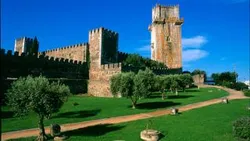

Portugal Beja History and Features Overview
Explore the rich history and unique features of Beja, Portugal. Discover its cultural heritage, historical landmarks, and everything that makes this region special.
Beja: A Historical Gem of Northern Africa
Mycarro AI
May 2, 2025
Introduction to Beja
Beja, a city in the north of Tunisia, is steeped in history and culture. Located at the intersection of various civilizations, it serves as a window into the past, showcasing remnants from different periods including the Roman, Byzantine, and Ottoman eras. Its strategic position near the fertile lands of the Medjerda River valley has made it a pivotal site for agriculture and trade throughout history.
Historical Significance
The ancient city of Beja, known as "Everca" during Roman times, thrived in the 1st century AD. Archaeological sites in the area have unveiled a wealth of information about this period, with well-preserved mosaics, ruins of Roman baths, and ancient fortifications still visible today. These remnants provide a fascinating glimpse into the life of Romans who inhabited the region, highlighting their advanced engineering and architectural skills.
In the medieval period, Beja became an essential administrative centre for the Aghlabids, a dynasty that played a crucial role in shaping the Islamic identity of North Africa. The medieval fortress, known as Kasbah, constructed during this era, stands as a testament to the city’s strategic importance. The fusion of Islamic architecture with local traditions can be observed in various buildings and mosques, further enriching Beja's historical tapestry.
Cultural Influence
Beja is characterized by its vibrant culture, which reflects a blend of Arab, Berber, and Mediterranean influences. The city is known for its traditional markets or "souks", where one can find a plethora of goods ranging from spices to artisanal crafts. Visitors to Beja can immerse themselves in the local culture by engaging with artisans, tasting traditional Rfissa, a famous Tunisian dish, or participating in seasonal festivals that celebrate its rich heritage.
The city is also home to various schools of thought in music and art, which echo the historical amalgamation of cultures. Whether it’s the sound of the "Mizwid," a traditional Tunisian wind instrument, or the vibrant colors of local tapestry artisans, Beja offers a sensory experience that celebrates its cultural diversity.
Modern Developments
In contemporary times, Beja has seen significant development while maintaining its historical integrity. Urban modernization has brought infrastructural improvements, enhancing transportation and connectivity for locals and tourists alike. While new buildings and establishments are sprouting up, there is a strong emphasis on preserving the historical sites that make Beja unique.
Education and technology have started to play crucial roles in the city, with various institutions focusing on historical research and the promotion of local culture. The integration of modern educational facilities helps nurture a new generation that appreciates and preserves its heritage while adapting to the complexities of the 21st century.
Natural Attractions
Surrounding Beja, the stunning landscapes of Northern Tunisia also beckon nature lovers. The region is blessed with rolling hills, lush vegetation, and a diverse range of flora and fauna. The nearby Djebel Boukornine National Park offers hiking opportunities, allowing adventurers to explore the natural beauty that envelops the city.
Furthermore, the proximity to the Mediterranean coastline allows residents and tourists alike to enjoy a warm climate, beautiful beaches, and delicious seafood. This closeness to nature makes Beja not just a historical place but also a retreat for those seeking to reconnect with the great outdoors.
Conclusion
Beja is a unique blend of history, culture, and nature, making it a hidden gem in Northern Africa. As it continues to evolve, the city holds onto its past while looking forward to the future. Whether you are a history enthusiast, a cultural explorer, or an adventure seeker, Beja beckons with its myriad offerings, promising an enriching experience for all who visit.